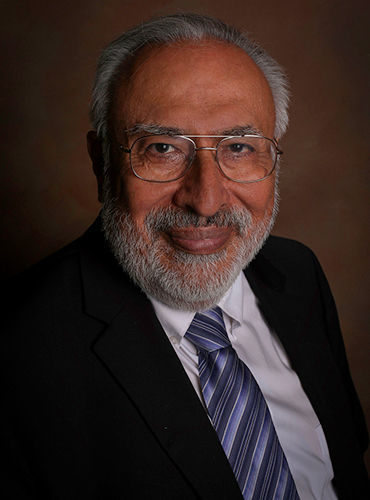
While many criminal justice professionals find themselves working in the capacity of law enforcement, Professor Juan Mejia pursued a different, yet intriguing career path. His role as a forensic psychologist places his expertise in “a process where justice is being sought, with questions and issues that are highly relevant to individuals and society.”
Throughout his 40-year career, Mejia has lent his extensive experience in criminal law to conducting psychological evaluations and presenting expert opinions during criminal court cases. Similar to other industries, a degree in criminal justice prepares students to expand their knowledge and incorporate their interests, which has opened the door of possibilities and rewarding challenges for professionals, like Mejia. “Those considering a career in criminal justice at this time will come into a highly challenging situation where they can use their energy, experience, and knowledge to bring about needed changes in the system,” he says.
Mejia earned his Ph.D. in clinical psychology from the University of Utah, an MA in psychology from California State University, Los Angeles, and a BA in psychology from Benedictine College. Below, Mejia sheds light on his career, the connection between psychology and criminal justice, and advice for rising criminal justice leaders.
You have an extensive background in psychology. Let’s start with what led you to practice in criminal law?
As a college student, I became interested in psychology and majored in it, with a passion for being a psychologist. My doctorate program at the University of Utah offered classes in collaboration with the law school, and I took advantage of that opportunity. After I received my doctoral degree, lawyers who knew me or knew of me asked me to become involved in cases they were working on. From there, my intrinsic interest in forensic psychology snowballed and has been a major focus of my training and practice.
From your experience, please explain how psychology and criminal justice work together.
There is considerable overlap in the practice of criminal justice and psychology, with issues that are highly relevant in both fields. My teaching experience and feedback from students thus far is that conceptualizations and perspectives from psychology can be highly useful in the practice of law enforcement and criminal justice in general.
Psychological theories and knowledge can shed light in understanding criminal thinking, the nature of substance addiction, and the course of mental illness, which characterizes the vast majority of individuals who find themselves in the criminal justice system. With this understanding, how to best implement evidence-based strategies of prevention, education, and rehabilitation of a broad range of offenders can be planned.
For someone interested in a career outside of law enforcement, what insight would you provide about pursuing the same path as you?
Along with earning a Ph.D. in psychology or clinical psychology, I would recommend that the interested person become familiarized with legal proceedings and laws that are applicable to the practice of forensic psychology, such as the legal concepts of insanity, competency, diminished capacity, extreme or exceptional hardship, substantial emotional damage, mitigation, and mental health court criteria. Familiarity with practices and procedures of community supervision, such as if you are asked to provide evaluations or treatment to probationers or parolees, is needed. Also, you’ll have to be oriented to providing your opinion exclusively as it relates to clinical concepts and legal concepts.
Why is now the perfect time for someone to consider an advanced degree in Criminal Justice?
The issue of how to best deal with offenders remains a major unanswered question. It is apparent to all that what we have had done for an extremely long time has not worked. In fact, in my opinion, it is getting worse. Crime rates remain high. Respect and support for law enforcement and the judicial system have eroded. Clearly, the societal environment in which we live accounts for much of it; however, criminal justice stakeholders have to rise to the challenge of our time and come up with best evidence-based practices to reduce recidivism and bring respect to the concept of justice implementation in our society.
What do you want students to take away from your course, CJ 510: Criminal Justice Leadership?
I want them to know that each one of them can become a highly effective leader. While it is ultimately an unanswerable question, I want them to be convinced that good leaders can be made, not necessarily be born. They’d benefit from grasping the concept of self-efficacy, where they can have a strong belief in themselves and that, in spite of varying characteristics in their unique personalities and thinking, they can ultimately understand what vision and principles are involved in effective leadership. This also means that they can incorporate that vision and principles into their leadership responsibilities and practices, understand evidence-based principles related to leading and motivating others to achieve the goals of the organization they lead.
What advice do you have for rising criminal justice leaders who want to initiate change in our society?
First of all, I admire anyone who takes on the responsibility of being a part of the criminal justice system. In many cases, such as in law enforcement, you are literally placing your life on the line in the pursuit of your responsibilities. A career in criminal justice will make you a target of fair and unfair criticisms. You need to develop the thick skin and wisdom needed to understand the difference between these reactions to how you do your work. You need to learn from both and integrate them into your practice as well as best cope with what does not fit.
Hopefully, you can inspire change and understanding in others for what you do. You can gain from embracing transparency and accountability. You are given significant power and trust from society and transparency and accountability can help you best do your job; with the respect you deserve.
Learn more about the MS in Criminal Justice program.


